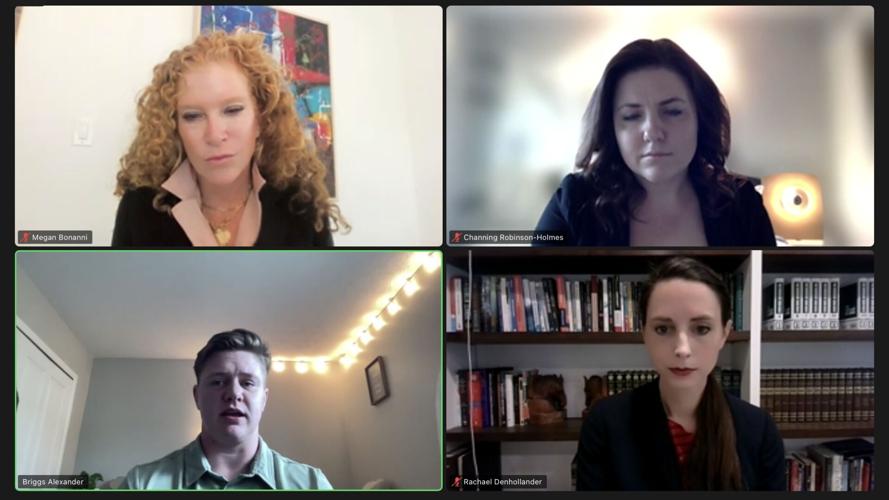LOUISVILLE, Ky. (WDRB) -- The two former University and Kentucky swimmers (and later assistant coaches) who have accused former swim coach Lars Jorgensen of serious sexual abuse, including rape, may be the "the tip of the iceberg" in a suit against UK, Jorgenson, athletics director Mitch Barnhart and former UK swim coach Gary Conelly, their attorneys said in a news conference Wednesday.
"We are convinced and have reason to believe that there are more victims and there are witnesses out there," said Megan Bonanni, an attorney for the plaintiffs. "... Coming forward today is to shine a light to make people know that it is safe to come forward. This is about holding individuals in power. ... (The suit) alleges that for over a decade, the University of Kentucky empowered Lars Jorgensen to foster a toxic, sexually hostile environment within the swim program in order to prey on, to sexually harass and to commit horrific sexual assaults and violent rapes against young female coaches as well as collegiate athletes, all of whom were very, very reliant on him."
Co-counsel Channing Robinson-Holmes said others have been in contact with attorneys since word of the case became public, but couldn't say whether those people would be additional plaintiffs or witnesses.
UK is named in the suit for not aggressively pursuing a warning about Jorgensen the day he was hired from a college at a previous school, who alleged an inappropriate relationship with one of his swimmers. The school also received a report, according to reporting by The Athletic, from a volleyball coach who saw Jorgensen allegedly groping an assistant coach in the hallway. Finally, when victims did go to the school's Title IX office, the suit says they were discouraged from filing reports.
Briggs Alexander is a plaintiff in the suit, along with another former swimmer who remains anonymous. Swimming at UK as Bridgette Alexander from 2014-18 and later serving as an assistant coach, Alexander experienced years of sexual abuse, including rape, by Jorgensen, according to the suit. (Having since transitioned, Briggs will be referred to in the present with male pronouns, though female pronouns will be used for the period for which abuse is alleged, at his request.)
Speaking publicly with reporters in a news conference via Zoom on Wednesday, Alexander said going public has been difficult.
"I think that I'm really sad," Alexander said. "I think that I'm really angry. And I feel very betrayed by the school because I did nothing but lead in the best way that I knew how when I was on the team and at the school. I wore the blue and white through the hardest days of my life. And to know that all this has happened and there's still no real support, I think that it hurts a lot."
Lawsuits reflect only one side of a legal case. Kentucky has made no court filing to date.
"Our top priority is the health and safety of our students and employees," the university said in a written statement Wednesday. "We have no tolerance for harm, harassment or abuse.
"To our employees, students and the entire University of Kentucky family, we want to be absolutely clear: we do not tolerate these types of behaviors. We will do everything possible to ensure the safety and well-being of our students, faculty and staff."
Barnhart, asked about the allegations on Sunday following the school's introduction of a new basketball coach, said, "I always say we always want to have safety for our student-athletes, our coaches and our staff. But other than that, I can't say."
No criminal charges were filed at the time the suit alleges that abuse was taking place. Alexander said that, given her mindset at the time, she was afraid that she would derail her career by coming forward, and did not have confidence that her claims would be believed.
"Throughout my abuse, for the years that it happened, you know, there was this sense of fear," Alexander said. "That, you know, people wouldn't believe me. Repeatedly, I was told from Lars that he was this just amazing human with so many connections in Lexington, that he had people in his corner. And I think outside of the fear that he put onto me, if you go to the police, XYZ will happen. That was real for me. And I just did what I needed to do to get to survive. And I think that the police is a very scary thing for student-athletes. I don't want to speak broadly about that, but I think that our police is the Title IX office. And I think that's what was, in my mind, the whole time. And, you know, outside of the fear of not going to the police, I think that I didn't know if anyone was going to believe me."
Alexander said the decision to finally report the allegations came after meeting with two other individuals connected to the swim programs who also had negative experiences with Jorgenson over other improper behavior. But Alexander said the experience with Kentucky's Title IX office was not a supportive one.
"I disclosed my abuse and thought that it was being taken care of," Alexander said. "And months went by, and I never heard anything back. So I reached out. And I was just repeatedly discouraged and vigorously discouraged to not come forward and to not, you know, publish this reporting. And I think that, again, I'm going to say that's what's hurt. That's what's hurting me the most right now in this moment. Because the Title IX office is there to protect us as student-athletes when when our coaches aren't protecting us. In this situation, he wasn't. We should have been able to trust the Title IX office and none of us could, and we didn't know that."
Rachel Denhollander is a Louisville attorney and victims advocate who has been working with the plaintiffs in this case for nearly a year. She also works with the Center for Safe Sport, which has assisted in this case. She said that cases like this one can spur the kind of change needed to make schools and other athletic associations take threats to athletes more seriously.
Denhollander can speak to survivors from experience. She was the first gymnast to come forward against Michigan State gymnastics trainer Larry Nassar, who now is serving a life sentence for sexually abusing more than 200 gymnasts during his time at the school. Denhollander won the Arthur Ashe Courage Award in 2018.
She called the decision of Briggs and the Jane Does in this case "absolutely critical" to begin to address systemic problems in women's sports. She said the trend of a coach leaving one school, sometimes because of improper or even predatory behavior, and being hired elsewhere, happens far too often.
"Until we can deal with the institutional failures that allowed a predator like Lars and all of these other predators that have come before him in these other universities, until we can deal with those institutional failures, you might be able to get one coach out of the way, but you can't do anything about the person that rises to take his place," she said.
Denhollander said she expects more light to be shed on the actions of the Title IX department at UK.
"There are a lot of these details, particularly about the discouragement in the Title IX process, that haven't necessarily been completely laid out and will come out at the appropriate time," she said. "Something that we do know from doing this over and over and over again is that when you see the tip of the iceberg, it's the tip of the iceberg, right? What we do know, based on the facts that we've already seen, is that there were choices that were made to ignore red flags, to ignore outright warnings, to discourage survivors from reporting. There were breakdowns in the culture, there were breakdowns in the policies and in the structure of the organization. We can already see all of those things. And we know what we're seeing from experience is the tip of the iceberg."
Robinson-Holmes said the legal team is only beginning to hear from others who might have experiences or information to share more insight into the situation in the Kentucky swim program. And, she said, that was a goal of Alexander's in making allegations publicly, and it is a goal of talking about the case in the media.
"We have had individuals reach out," she said. "Now, whether or not they're potential plaintiffs or more appropriate as witnesses, we're still assessing. But we have had individuals reach out. We're very thankful for that. I think Briggs has, by telling his story, inspired others to come forward. And I know that that's incredibly important to Briggs. As he stated, he wants to provide a safe space and an outlet for folks to come forward and deal with that trauma. And we see that individuals are, so to that point, Briggs has already been successful. But we anticipate that more will come forward. It's an incredibly difficult thing to do."
Briggs said he would encourage anyone to come forward who had bad experiences in the swim program, difficult as it may be.
"None of us deserve the environment that was created by our head coach," he said. "And in saying that, we were teammates at one point and I hope that we can be teammates through this. I've gotten so many messages of love and support, just people saying that they're here for me. And I think that's a testament to people on the team understanding what the environment was, and they can see it now. And I think that, through watching me put my heart and soul out there and be really vulnerable with the world, I hope that when I speak to them, they can come to me or come to my team that I've built here, and really lean on us because this is not easy. I just want you all to know that if you do have a story, whether you think that you're crazy or not, trust me, you're not. It's important. And I think that we all deserve peace and healing from this time of our lives."
As for the university and its response, Denhollander said the time to examine its actions and fix any problems it encounters in how it handled this situation is now.
"UK desperately needs to take the step right now of commissioning a truly independent assessment with full access to all relevant information, so that they can make determinations about what went wrong and why and take the needed steps to fix it," she said. "Without full institutional transparency, you cannot fix the problems that led to this. And that's going to be absolutely critical if the next generation of athletes is going to be protected."
Related Stories:
Copyright 2024 WDRB Media. All Rights Reserved.














